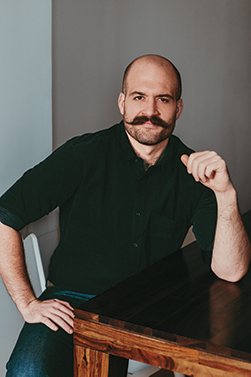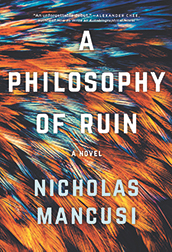
It begins with the news of a death: Oscar Boatwright’s mother has died suddenly aboard an airplane from a deep vein thrombosis. We follow Oscar and his father through the horrible banalities of dealing with his mother’s body, and end up back at Oscar’s faculty apartment. Oscar is an assistant professor of philosophy, “with a focus on metaphysics when he wasn’t teaching intro,” at an unnamed university. Our first clue that his reliance on philosophy—or any kind of doctrine—will fail him comes early, when he leaves his grieving father alone to go play a secret game of squash with a colleague. This is the smallest in a chain of miscalculations that leads to one of the most astounding literary meltdowns in recent memory.
Oscar is bereft by his mother’s death, but what motivates him is not grief so much as anger: His father confesses that the couple is penniless, after paying a “self-anointed guru” named Paul St. Germaine thousands of dollars for private seminars. Oscar watches St. Germaine’s order-by-mail DVD seminars, outraged by—what else?—their lack of rigor. He composes an angry email to St. Germaine, the kind of acid takedown one might write for fun but never send. Yet Oscar hits the send button.
The book features one of the most astounding literary meltdowns in recent memory.
But back up: it gets worse. Arriving back to campus from his mother’s funeral, Oscar is invited out to a philosophy department dinner with a guest lecturer. Oscar goes bar-hopping, gets blackout drunk and ends up in bed with a young woman. In his Monday intro class, “when he was passing out notes to accompany his lecture on Cartesian dualism,” there she is, sitting in the third row. Wonderfully tense and comedic conversations between teacher and student ensue, and Oscar ends up in what looks pretty much like blackmail. The student, Dawn, and her slightly cartoonish buddy Ramos need him to do them a favor. That’s where the drug running comes in.

A Philosophy of Ruin
By Nicholas Mancusi ’10
Hanover Square Press
Some literary novels make obligatory gestures at plot; Mancusi absolutely drenches his novel in it. The book has the inexorable narrative spiral of a movie like A Simple Plan—or, better yet, like the slow-motion footage of the detonation of the old Tappan Zee. Comparisons abound to television tropes firmly established in shows such as Breaking Bad. But Mancusi knows that here, given his protagonist’s philosophical training, the narrative is illustrative of larger ideas—namely, determinism versus free will. Oscar begins to live out St. Germaine’s nihilistic philosophy, just to see if it offers some relief, as it had for his mother’s depression. (Some of the best writing in the book is Oscar remembering being raised by a depressive.) A Philosophy of Ruin is probing a kind of existential depression very much in the contemporary ether. What troubles Oscar most is not his individual life but whether or not life matters at all—and if, in fact, those of us bent on understanding life cerebrally have wasted those “endless hours … in pursuit of perception.”
Dark though the material is, Mancusi’s writing style is vivacious, entertaining and funny. His dialogue is pitch-perfect, just a tad surreal. Oscar reads message-board threads filled with the “internet patois of the over-sixty set”; he notes that squash is a sport that “asked for grace but would settle for fury.” Remembering the Western Massachusetts town where he went to a “fancy liberal-arts college” (cough-cough), Oscar calls it “a town so liberal that it seemed at times like a cautionary tale in a right-wing chain letter.”
Moreover, there is much truth in Oscar’s observation that most of us go through life “hoping that you’ll sneak past the hounds of catastrophe without letting them get your scent.” Part of why we read novels is because we know that sneaking past the hounds is impossible, and we want to hear what happens next.
Gaige was the visiting writer at Amherst from 2011 to 2016 and again in 2018–19. Her fourth novel, Sea Wife, is forthcoming from Knopf next spring. Find her at amitygaige.com.
Photo by Sylvie Rosokoff